You can't call yourself a farmer or homesteader until you have gone out in the freezing cold and broken up icy waterers. But, we think that experiencing that once or twice is plenty enough for anyone. There are several tips you can use to keep goat and chicken water from freezing.
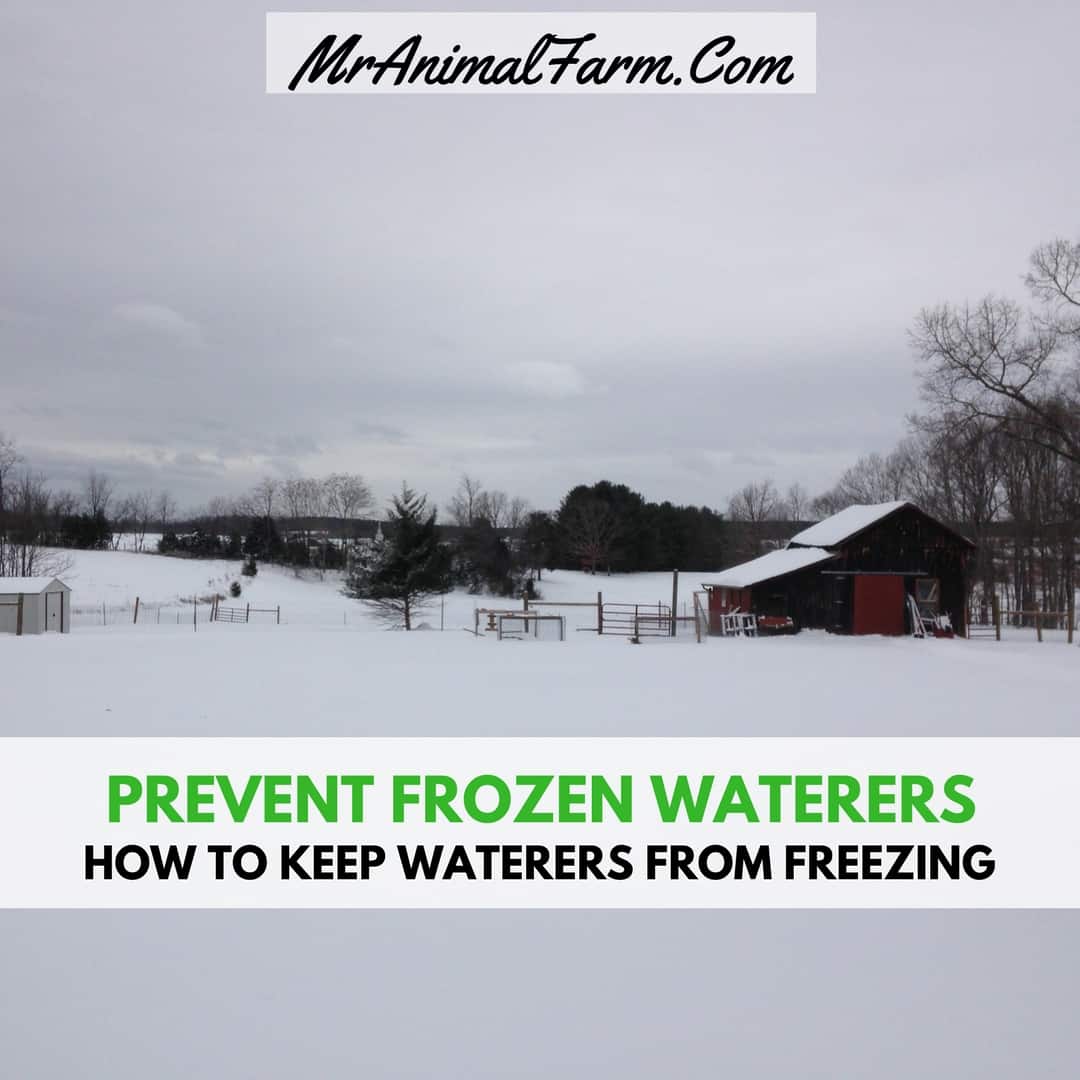
So, unless we move back to Florida (where winter is 50 degrees), we need to find ways to keep waterers from freezing in the winter-time. (For more winter fun, check out these Winter Farm Activities you should try!)
If you are trying to figure out how to keep your chicken water from freezing you may also need to know how to keep chickens warm in the winter and how to care for goats in winter.
Here are some ideas for how to keep chicken water from freezing
If you want to keep your chickens healthy, they need access to clean and fresh water regularly. Therefore, you would need to make sure that their water doesn't freeze and stay frozen.
Now, they aren't like ducks who need pools of water, chickens can swim, but prefer not to. But they still need fresh drinking water, of course.
We decided to break our list down into a few parts based on difficulty and convenience since there are so many different kinds of waterers; active, passive, electric, and other options.
Let's start with active methods.
Active Ways to Prevent Frozen Waterers
Active methods of prevention are when you have to perform an action to keep the waters from freezing. They take the most time and effort but they are also very effective.
Break It Up
This does not actually keep the water from freezing but is simply a way to allow your chickens to drink. Go out several times throughout the day and physically break the ice on top of the water.
You can then scoop the large chunks out which will help slow the freezing process down a little but not by much.
This is obviously the least preferable method and you are probably here because you are sick of doing it. Read on for some better ways.
Boiling Water
The boiling water method is the most time consuming method on this list. It entails you boil water, carry it outside, and pout it into one or several frozen waterers.
It works because the water is obviously well above the freezing temperature. However, warm and hot water freeze more quickly than cold water so you will end up taking boiling water out several times a day.
We have found that you can just use really hot water from the tap, but it is not quite as effective as boiling water.
The Bucket Swap
There is nothing fancy about the bucket swap method. In fact, by it's name, you can probably guess how it works.
Basically, you give your animals a bucket of water while leaving another bucket or two inside your home or heated barn. When the first bucket freezes you take a fresh bucket out and swap them.
This allows the original bucket to thaw inside while the chickens continue to have a fresh, unfrozen water source.
Need some help keeping your chickens health and care taken care of? Check out the Organized Chicken Keeper for an easy to follow system.
Passive Ways to Prevent Frozen Waterers
Passive methods are those that you have to put the effort in up front but will continue to work for you as time goes on. Some methods are more effective than others but are definitely easier than the active category.
Deep Litter Stalls
The absolute easiest passive method is so easy, you end up doing less hard work even before it gets cold outside. Deep litter is when you allow animal waste, straw, hay, and other organic material to build up a bit inside of their stall or pen. Not enough to be dangerous but enough that it will take the winter to compost down.
Compost creates heat and can help raise the temperature in the stall a bit. If you are just barely under the freezing point, leaving the water in their stall may be enough, combined with their body heat, to keep the water from freezing.
Sunlight
The second easiest passive method is simply put their water in a spot that gets a lot of direct sunlight. The sun will heat up the ground, the water, and the waterer and will keep the water from freezing as quickly.
Of course, if it is too cold, this won't make a huge difference but it can help a bit in more mild climates.
Magnify It
You can amplify the sun light a bit by sticking some glass or an old window between the water and the sun. This is obviously not a great idea with goats as they will likely break the glass and get injured. But with chickens, you can set something up pretty easily and make your own little solar heater.
Black Rubber Tubs
Instead of using larger buckets or metal waterers, we have switched to big, wide, black rubber tubs.
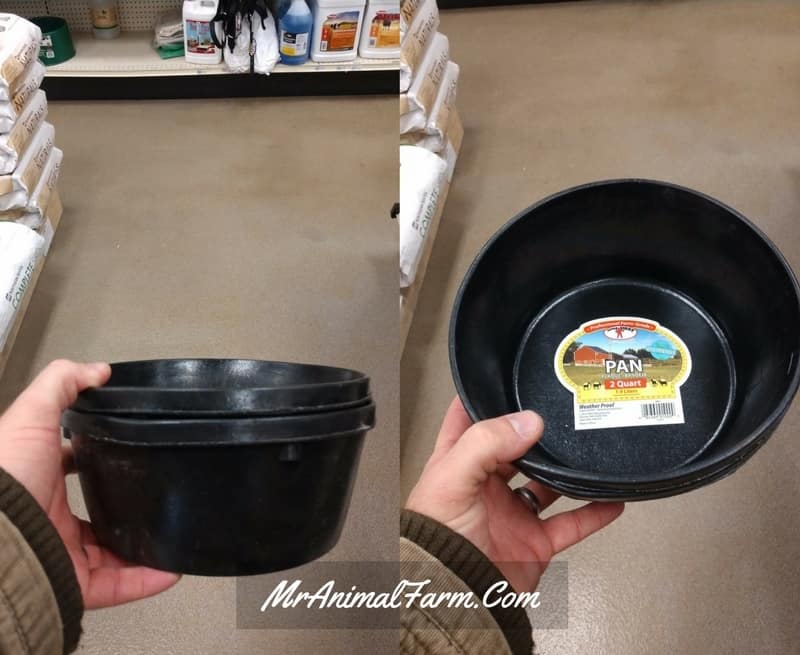
These are great for a couple of reasons. They are flexible and do not break easily. You can bend them and pop the ice right out. Plus, when placed in the sun, the dark rubber will absorb the heat of the sun and keep the water a little warmer than the outside air
Best of all, they are pretty inexpensive!
The Ping Pong Ball Trick
We saw a lot of people suggesting using ping pong balls in the waterer. The idea behind this is the wind blows, moves the ball and prevents ice build up. We saw it enough times so we decided to give it a try.
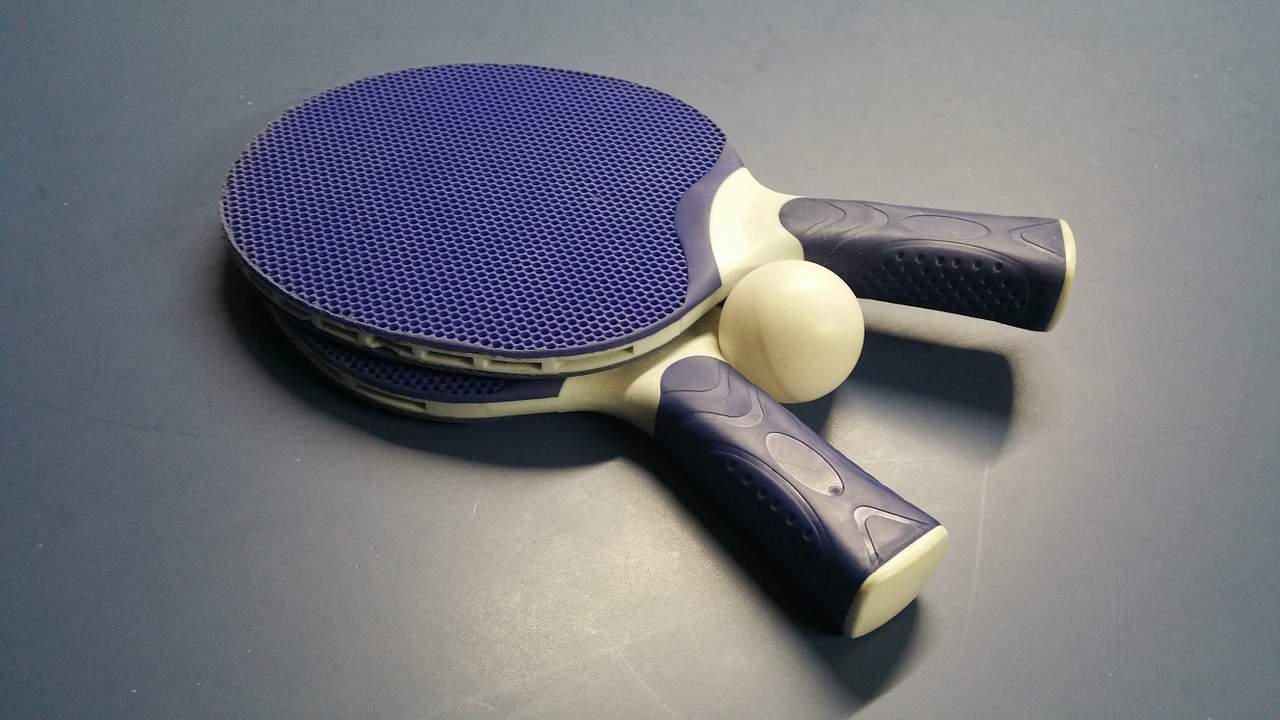
What we found was the ping pong balls were hit or miss on whether or not they would prevent the water from freezing. However, the chickens LOVED having floating toys in their water.
Your mileage may vary on whether this method works for you. We would definitely not try this in our goat or herd protecting dog's water. But for chickens, it's worth giving a shot.
Salt Water Bottle
This is another one of those methods that is very popular online but has mixed results. The science explanation we've read makes sense. Essentially, the salt raises the freezing temperature of the water in the bottle and thus keeps the temperature in the water bucket just high enough to not freeze.
It seemed to be effective at times but it was not 100%. The water in the bottle did stay unfrozen most of the time though. And since it would float it did make it easier to find a weak spot to break the ice.
Again, this one is probably dependent on how cold your area gets. If you want to try it, get a plastic soda or water bottle (the 16.9 or 20 oz bottles). Pour in about ¼ cup of salt and top it off with water. Screw the cap on tight and toss it in the water bucket.
For the lucky ones, you will have access to electricity of some kind. We have electricity in our big layer flock coop and our goat stall. (You can make all kinds of different DIY goat pens to suit your needs) Electricity will allow you to prevent frozen waterers by using heated waterers for your animals.
Electric Ways to Prevent Frozen Waterers
Using electricity is definitely the easiest and most effective method of keeping your waters from freezing. Any of these methods will reliably keep your water above the freezing temperature.
Heated Base
We, like most chicken farmers, use traditional, double walled metal waterers. The double walls actually do a pretty decent job at insulating the water from freezing. However, the metal does get cold quickly and when the outside temperature really drops, the double walls don't really do enough.
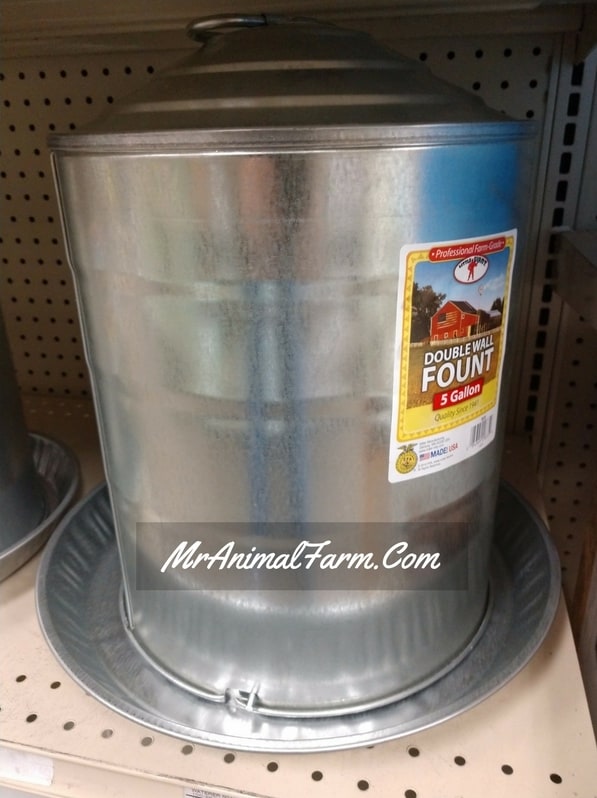
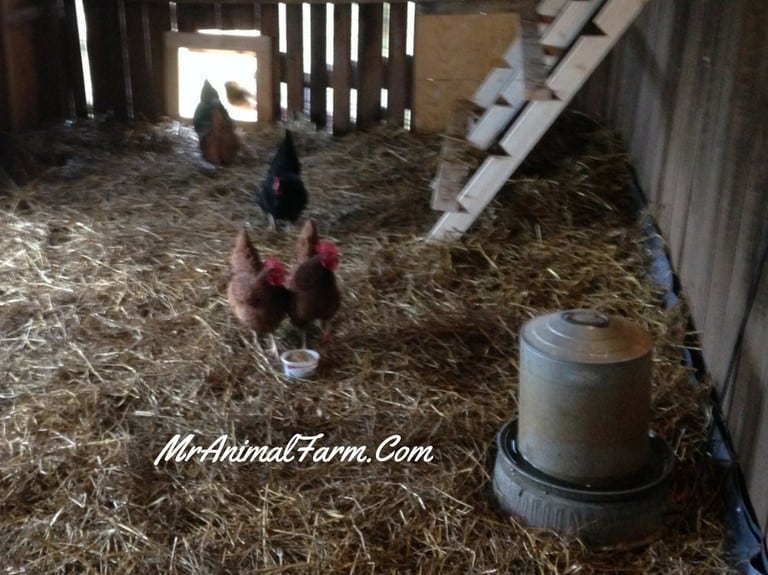
So we have a heated metal base that keeps their water from freezing. It's small, lightweight, and waterproof so it works really well for our flock. It plugs into any standard 3 prong outlet.
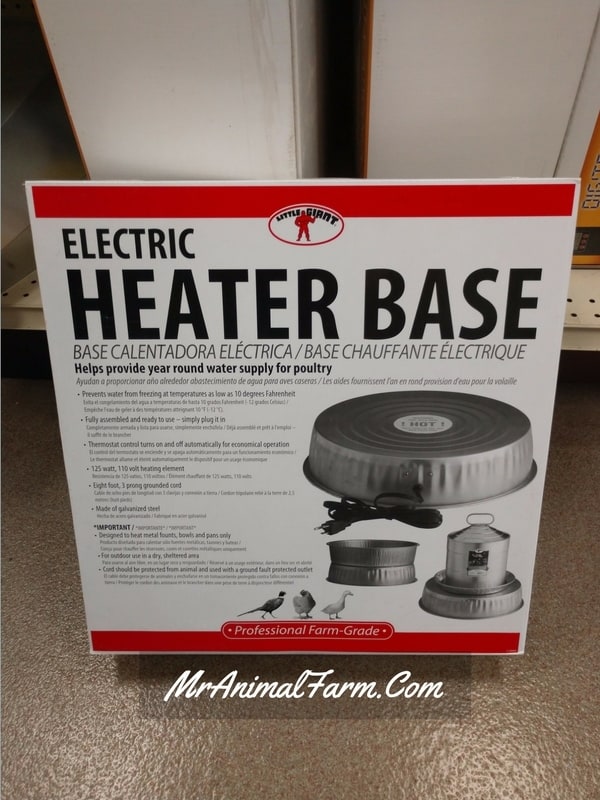
Heated Buckets And Bowls
For the goats, we switch them over to a plastic heated bucket. They are really convenient and keep the water just above the freezing temperature but not high enough to be a fire hazard.
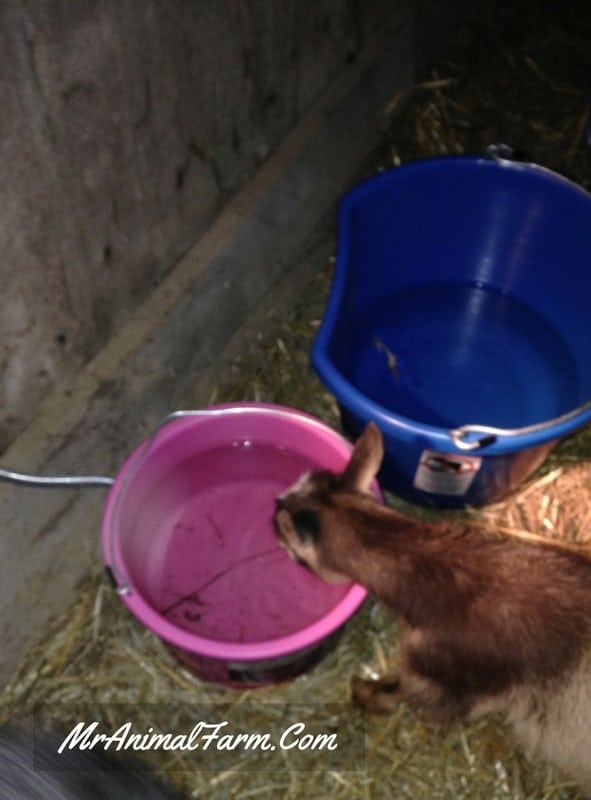
The power cord is also wrapped in a metal coil to discourage any chewing from curious goats and mischievous guard dogs.
If you want something a little smaller you can also get heated dog bowls that work the same way.

Tank De-Icer
You can also get tank de-icers which look kind of like a coil that you drop into the bottom of the water bucket. These are great if you have a larger herd and don't want to drain your water trough for the winter.

The Old Light Bulb In The Cinder Block Trick
This one requires a little bit of handiwork on your part but can be a fun little project if you're into it.
You need a cinder block, flat paving stone around the same width and depth, a 100 watt lightbulb and matching light socket.
You will want to mount the light socket inside of one of the holes in the cinder block and turn the bulb on. Place the paving stone across the top completely covering both openings.
Place the waterer on top of the cinder block. The light bulb should keep the cinder block warm enough to keep the water from freezing.
Be aware that an exposed lightbulb and electrical equipment near water and in a coop can be a fire hazard. Please take all needed precautions if using this method to avoid a coop or barn fire.
The Heated Coop
This is the most expensive, and impractical, method but it is sure to keep your waters flowing. You can build a heated coop. Whether you have heated water running through the walls, forced air, or some other method, an insulated and heated coop will keep your waters from freezing.
Other Options
Alternatively, if you have electricity, but maybe not directly in your coop, you can always run an extension cord. Make sure you follow safety rules.
Don't put it where animals can chew it, make sure to inspect regularly for damage etc. We do this for our growout coop which is a few feet from our goat stall. In the growout coop we use a heated plastic poultry waterer.
For the plastic bucket and the plastic waterer, we do change these out during times that we don't need them. The reason we do this is that they are pretty expensive. So we like to put them away and not risk them getting broken when they are not in use.
This year, we will be facing the no electricity situation for a few of our breeder coops. They are spaced significantly away from the barn and we are hesitant to run extension cords all over.
Plus, buying several heaters for 5 pens could get pretty expensive. However, we still need to figure out how to keep these chicken waters from freezing.
So, this year we will leave their small regular waterers in their coops with them at night, but we are also supplying them with big, wide, rubber bowls in their run area.
What ideas do you use to keep waterers from freezing on your homestead or farm in the winter?
If you need more help with taking care of your chickens, check out The Organized Chicken Keeper for a complete system for managing their health through keeping their supplies stocked and coop clean.

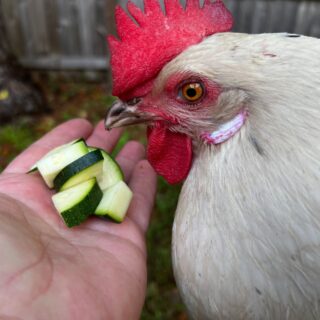
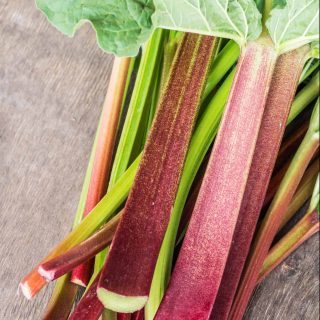
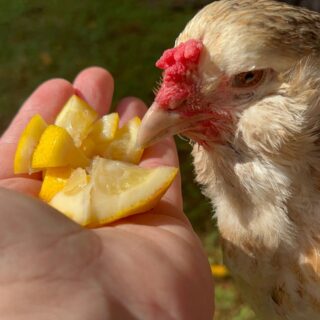
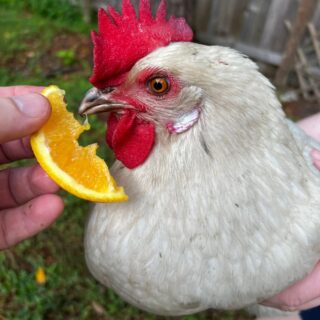
Kathy says
I bought a 5 gallon bucket, put 3-4 nipplers on the bottom of the bucket. The top inch of water in bucket will freeze, but the nipplers on bottom of bucket were working. I live in southern Oregon, and don’t get really harsh winters, but this is certainly a practical method for some. Not to mention, the water stays MUCH cleaner!
S says
I use passive solar stock tank heaters and av passive solar heater for my chicken water. I store them in the summer and put them out in the winter. Works very well. Thin ice forms when we have high wind and temperatures around zero. I place a piece of plywood over the opening at night. This seems to help as well.
MrAnimal Farm says
This is an awesome tip!
Clergylady says
I have winters that easily dip below zero. I use rubber bowls with slightly flared out sides. Easy to break out ice and refill. Regular waterers have to come in the house and be defrosted in a bathtub of warm water then filled and carried out. This works for chickens, ducks, and rabbits. I don't have electricity in any of the pen areas. I use a motion sensor solar light in the room with my rabbbits. Sensor and light inside, panel outside. Plan to add same to well house. We have solar day and night or solar motion sensor lights around the home, pens, and shops here on my property. Three residences, a well, a large kiln fired three nights a week, and electric heaters in two residencrs costs us under $150 a month. We have replaced all light bulbs with LED bulbs unless we use a standard bulb for heat. When I finish the new area for my critters there will be power available but I will still use it sparingly. I may figure out some other way to do solar heated water. I have seen candles used in a cookie tin under a chicken waterer. Haven't trien that. My summertime shower is even solar heated water in a good quality hose coiled up in the sun. Wintertime I have a propane waterheater. Run it an hour before showers and washing dishes then turn it off. By being careful my son and his family, my best friends and their two grandkids, and my husband and I can live very inexpensivly. Critters live well. My garden is grown for all of us and treats for the critters. A small patch of alfalfa is shared by the critters and growing tips make tea for me to mix with mint and stevia leaves. Alfalfa seed and lambsquarter seeds make sprouts for wintertime treats for all the critters. We eat sprouts as salads in winter. I can, dehydrate, and freeze food for all of us. I hope to add heritage turkys this next year. Still don't plan to use electricity in their pen area.
K8 says
Capped bottle of 75% salt water inserted into waterer. Salt water will not freeze and will float around in waterer keeping it mostly from freezing solid...at least here in Idaho winters. Less thick ice to remove from waterers. Can be stored and used for years.
MrAnimal Farm says
This is one we haven't tried yet, but were planning to try this year. Glad to hear it is working for you! We will definitely give it a try this year too 🙂
Sueann says
I live in Northern Minnesota. I built a small wooden platform for under a large watering bowl. Under the platform I lined it with a heavy aluminum foil and attached a low watt bulb, 40watt works nicely, the heat from the light kept the water from freezing and it gave off enough extra heat to keep the pen warm.
MrAnimal Farm says
This is another great idea! Thanks for sharing!
Best,
Kristin